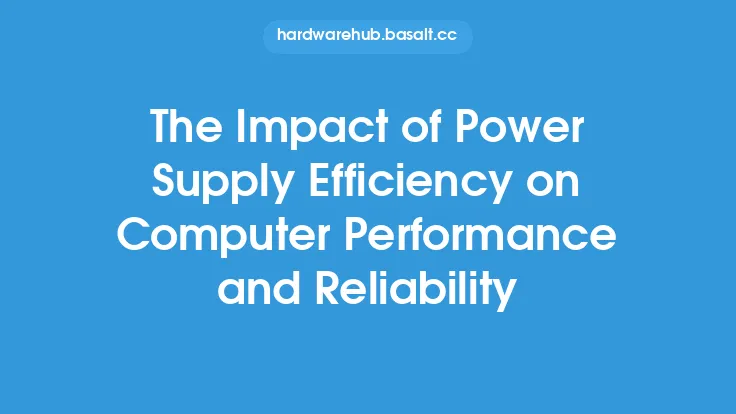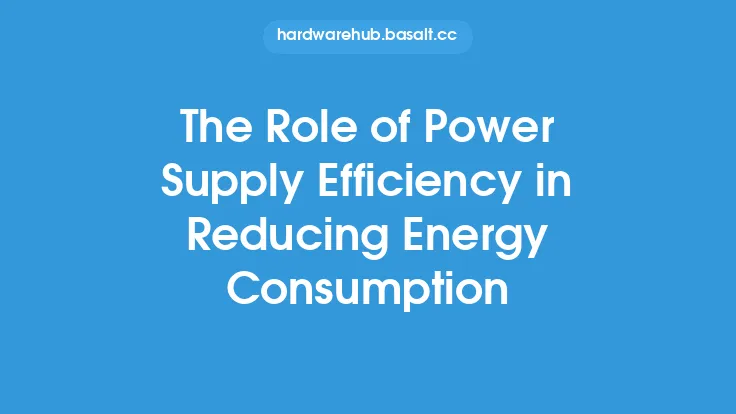The power supply, a crucial component in any computer system, has undergone significant transformations over the years. From its humble beginnings to the sophisticated designs of today, the evolution of power supply design and efficiency has been a remarkable journey. In the early days of computing, power supplies were simple, bulky, and inefficient, often wasting a significant amount of energy as heat. However, as technology advanced and the demand for more powerful and efficient systems grew, power supply design and efficiency became a major focus area for manufacturers.
Introduction to Power Supply Design
Power supply design involves a deep understanding of electrical engineering, thermodynamics, and materials science. A typical power supply consists of several key components, including the input filter, rectifier, voltage regulator, and output filter. The input filter helps to reduce electromagnetic interference (EMI) and improve the overall efficiency of the power supply. The rectifier converts the alternating current (AC) from the mains to direct current (DC), which is then regulated by the voltage regulator to produce a stable output voltage. The output filter, typically consisting of capacitors and inductors, helps to reduce ripple and noise in the output voltage.
Advancements in Power Supply Efficiency
One of the most significant advancements in power supply design has been the improvement in efficiency. Modern power supplies are designed to minimize energy waste and maximize the conversion of AC power to DC power. This is achieved through the use of advanced materials, such as high-frequency transformers and low-resistance capacitors, as well as sophisticated control circuits that optimize the power conversion process. The 80 PLUS certification program, introduced in 2004, has played a significant role in driving the development of more efficient power supplies. The program sets standards for power supply efficiency, with different levels of certification (such as Bronze, Silver, Gold, Platinum, and Titanium) indicating the level of efficiency achieved.
Switch-Mode Power Supplies
Switch-mode power supplies (SMPS) have become the dominant design in modern power supplies. SMPS use high-frequency switching to convert the input voltage to the desired output voltage, resulting in significant improvements in efficiency and size reduction. The use of pulse-width modulation (PWM) and resonant converters has further improved the efficiency and reliability of SMPS. Additionally, the development of advanced topologies, such as the interleaved buck converter and the phase-shifted full-bridge converter, has enabled the creation of high-power, high-efficiency power supplies that are compact and reliable.
Modular Power Supplies
Modular power supplies have become increasingly popular in recent years, offering improved flexibility and cable management. Modular power supplies use connectors to connect the power supply to the various components in the system, such as the motherboard, graphics card, and hard drives. This design allows for easier installation and removal of components, as well as improved airflow and reduced clutter. Modular power supplies also enable the use of shorter cables, which can help to reduce electrical noise and improve overall system reliability.
High-Efficiency Power Supply Technologies
Several high-efficiency power supply technologies have emerged in recent years, including digital power supplies, synchronous rectification, and LLC resonant converters. Digital power supplies use advanced digital control circuits to optimize the power conversion process, resulting in significant improvements in efficiency and reliability. Synchronous rectification uses high-speed power MOSFETs to rectify the output voltage, reducing energy losses and improving overall efficiency. LLC resonant converters use a resonant tank circuit to convert the input voltage to the desired output voltage, resulting in high efficiency and compact size.
Power Supply Form Factors and Connectors
Power supply form factors and connectors have also undergone significant changes over the years. The ATX form factor, introduced in 1995, has become the standard for most desktop power supplies. The ATX form factor specifies the size, shape, and connector layout of the power supply, ensuring compatibility with a wide range of systems. Other form factors, such as SFX and TFX, have been developed for smaller systems, such as mini-towers and small form factor PCs. The development of new connectors, such as the 6-pin and 8-pin PCIe connectors, has also enabled the creation of high-power graphics cards and other components that require high levels of power.
Conclusion
The evolution of power supply design and efficiency has been a remarkable journey, driven by advances in technology and the demand for more powerful and efficient systems. From the early days of simple, bulky power supplies to the sophisticated designs of today, power supply design has become a highly specialized field that requires a deep understanding of electrical engineering, thermodynamics, and materials science. As technology continues to advance, we can expect to see further improvements in power supply efficiency, size reduction, and reliability, enabling the creation of even more powerful and efficient computer systems.





